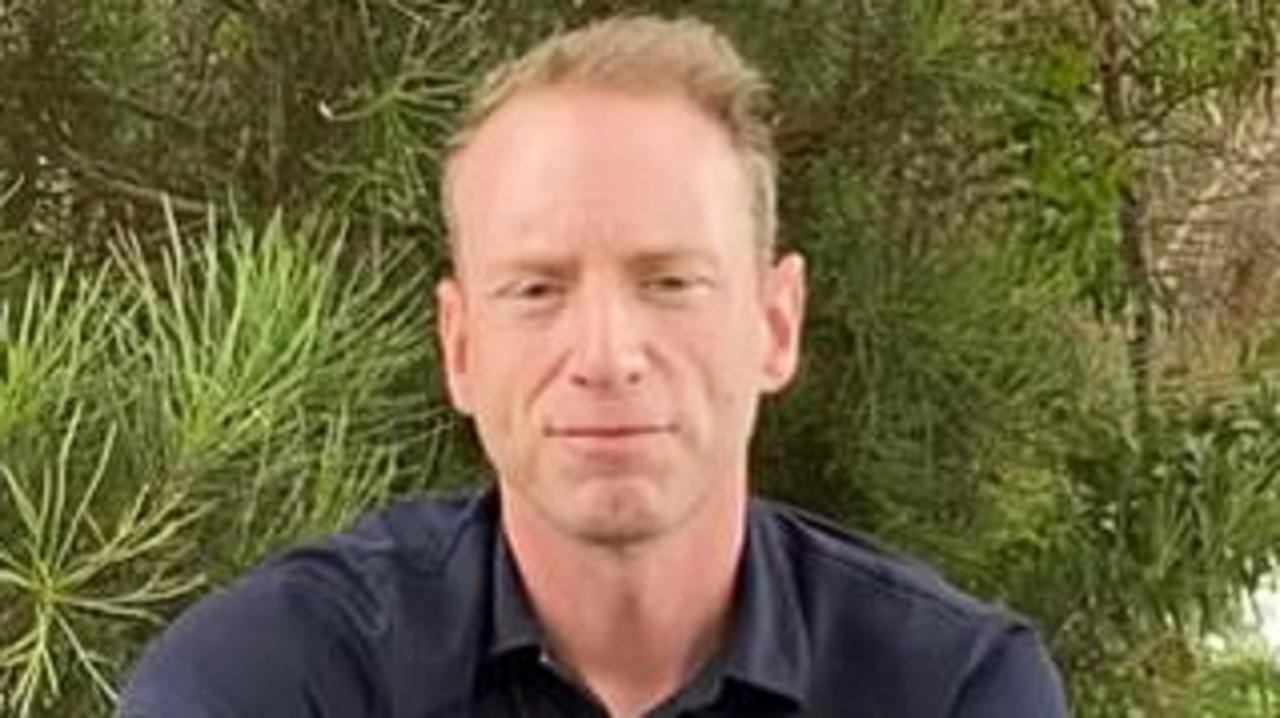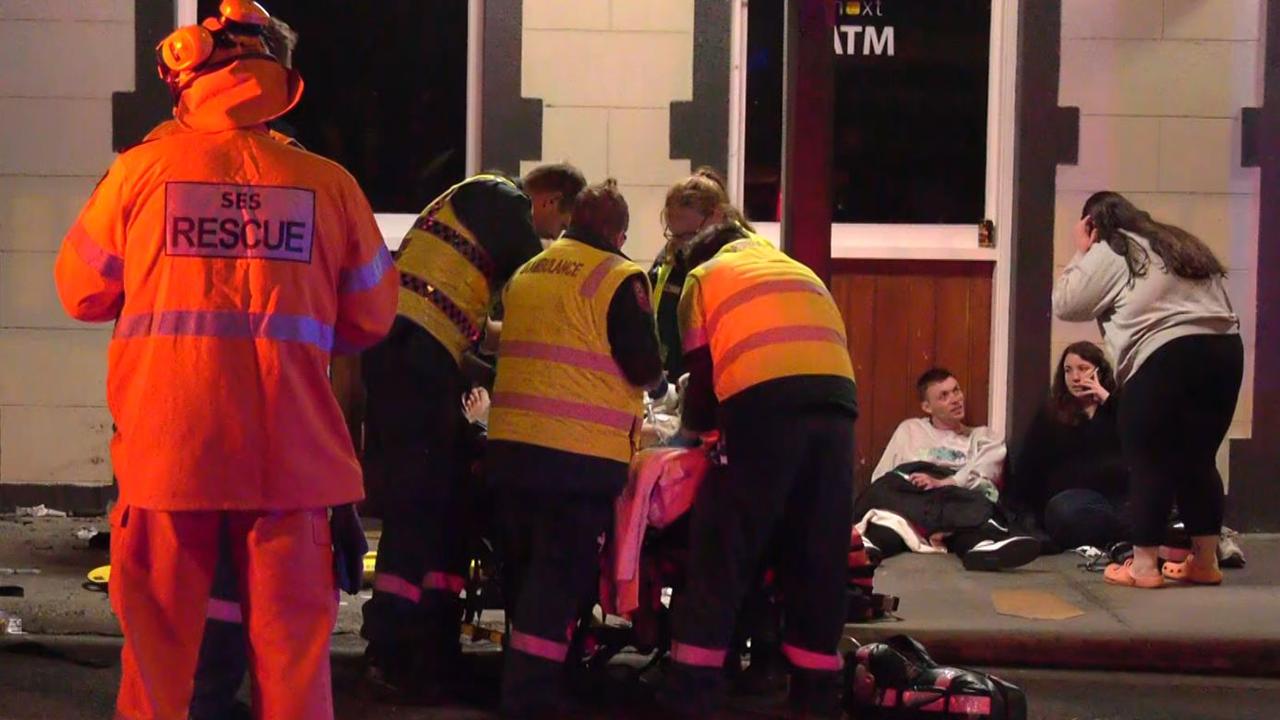Meet Peter Malinauskas and his family: Kids, politics and planning their social calendar a year in advance
He’s been in the job a year, and South Australia’s premier has a lot of balls in the air – but few are as significant as one major bet he’s placed on the state’s future.
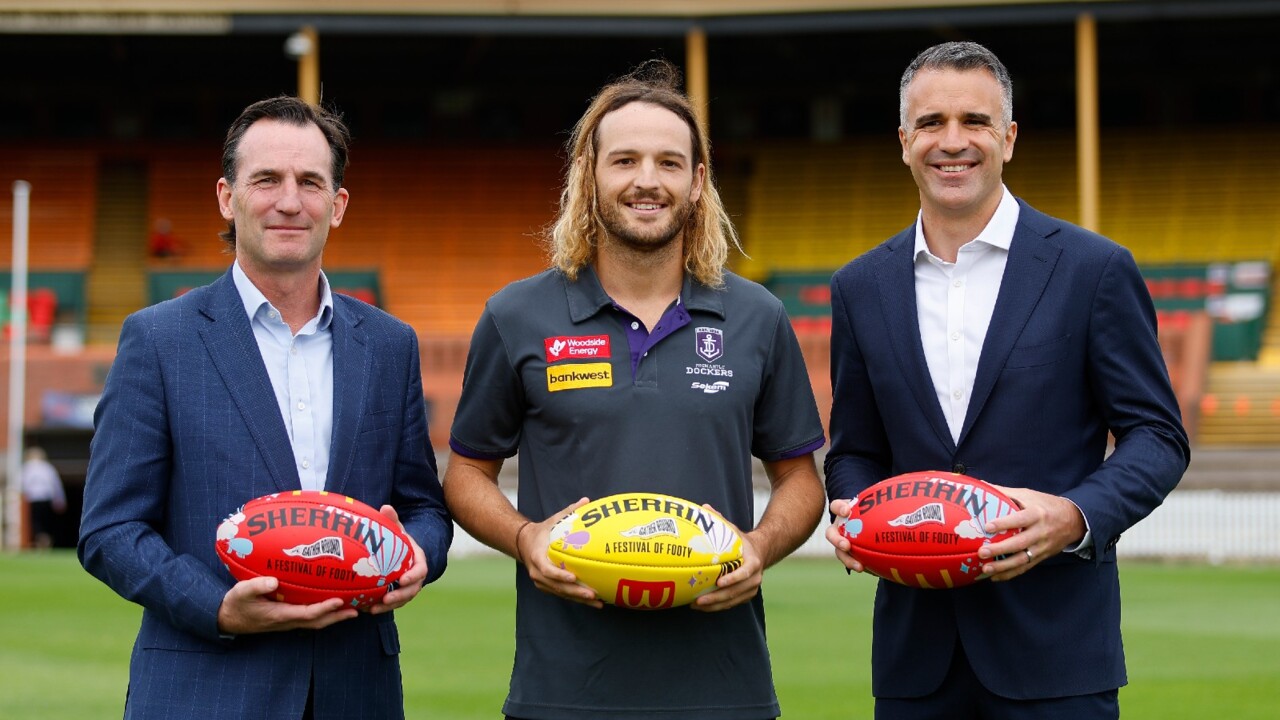
SA News
Don't miss out on the headlines from SA News. Followed categories will be added to My News.
It’s easy enough to picture the scene. A Mexican restaurant in the seaside town of Victor Harbor. It’s the summer holidays. At one table is a married couple. The man is in his early 40s, his wife maybe a bit younger. But it’s not your normal holiday conversation. It’s not about which beach to take the kids to tomorrow. The iPads are out, but it’s not to check the timetable for the Cockle train.
Instead, the duo are trying to co-ordinate diaries for the next year.
Yes, the next year.
When will they be able to fit in the basics such as family dinners, holidays, date nights.
“We probably did look a bit strange with our diary planners, especially in January,’’ says Annabel Malinauskas, wife of South Australian Premier Peter Malinauskas.
It was an effort to try to schedule a little normality into an abnormal life.
“It was sort of overarching themes, when we might try and have a date night or let’s try and go out once a month to dinner and have one night a week as a family, that kind of thing,’’ she says. The date nights have fallen by the wayside. Or, to be generous, been adapted to suit changing circumstances.
“Most of the date nights haven’t happened. But that’s mainly because the two of us are tired and we’d both rather stay home and get takeaway or something. That still counts, I think, as spending time together,’’ Annabel says with a laugh.
Both Malinauskases knew before the 2022 state election that if Peter and Labor took government from Steven Marshall’s Liberals, life would change.
“Annabel and I spoke about that and we’ve made conscious decisions as adults about what would be involved in taking on this responsibility with young kids,” Peter Malinauskas, 42, says.
“So we knew what it means. But you can make a decision knowingly, but that doesn’t necessarily prepare you for how it makes you feel. That’s the thing that’s sort of been hardest, but it doesn’t come as a surprise.”
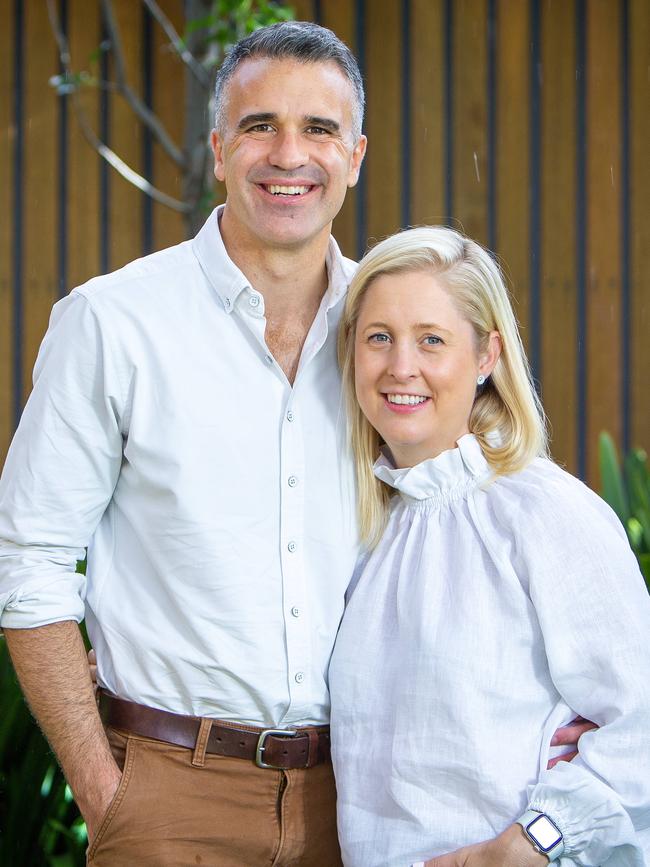
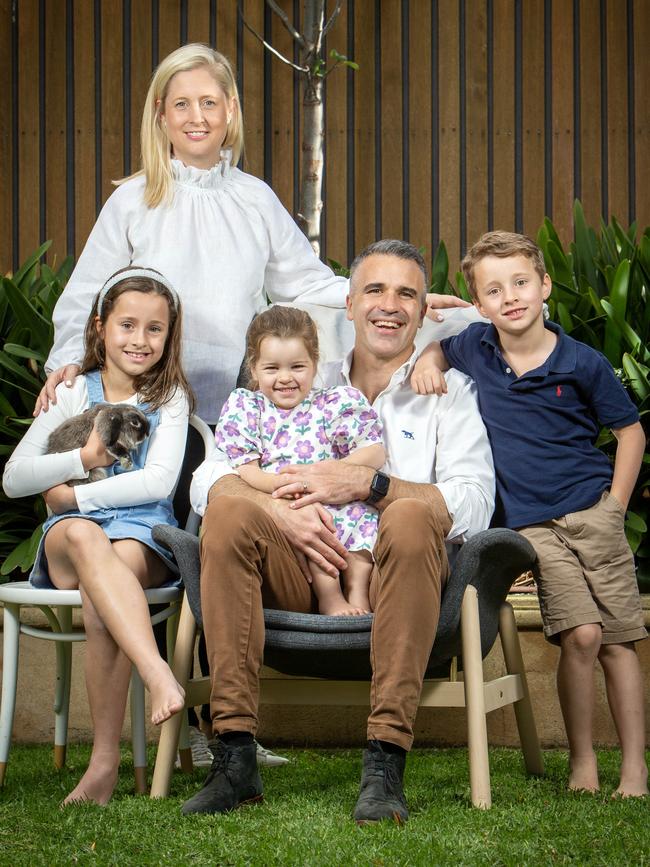
The couple have three children. Sophie, 8, Jack, 5, and Eliza, 3.
Annabel has her own high-flying legal career as well. It turned out to be easier to schedule an interview with her husband. Peter even called to apologise for his wife when she couldn’t make one interview, caught up in her hectic work life.
Annabel, who also goes by Annabel West in professional circles, is a corporate lawyer and partner at Thomson Geer who specialises in mergers and acquisitions and has a strong international client base.
She works 4½ days a week. A couple of days she will leave early to do the school pick-up or to take Sophie to netball. She will work from home other days and is grateful for her company’s flexibility. But she acknowledges they also rely heavily on a family support group.
“Between me and the grandparents and the babysitter, there’s a bit of a schedule that most of the time hangs together,” she says.
But Annabel is the one also responsible for maintaining some form of normality in family life. Her husband is out most nights of the week.
“I was talking to someone about this the other day and I will go through periods where I’d have dinner at the Convention Centre or the Adelaide Oval almost every night of the week,” Peter says.
Annabel has access to her husband’s diary and tries to slip in a family dinner but “it’s easier said than done”.
“We know that it’s not going to be quantity, but … we take time to have quality time when we can, so whether that’s taking the kids to the zoo or when we go on holidays, you’re making sure that we kind of switch off and really just try to enjoy that time with the kids,” she says.
Sunday seems to be the easiest night to organise, but even then “things come up that are so important that they have to take precedence”.
Annabel says while the kids would like to see their father more often, they were coping well. His face being up on every other Stobie pole during the election was a bit strange, but while Sophie is old enough to understand, Jack and Eliza are still oblivious to dad’s job.
The pair met at a 21st and were married in 2013 and Annabel says the disruption to family life is worth it because “he’s got a small window to do it. He just wants to put everything in and do as best you can in that time to make a difference as best he can”.
And, it’s politics, so “we know it’s not forever, so we do the best we can to muddle through it.”
Annabel is too wise to put a time frame on “forever”, but her husband is just over a year into a term that will last four and most likely at least eight years, given the large majority Labor secured after the last election.
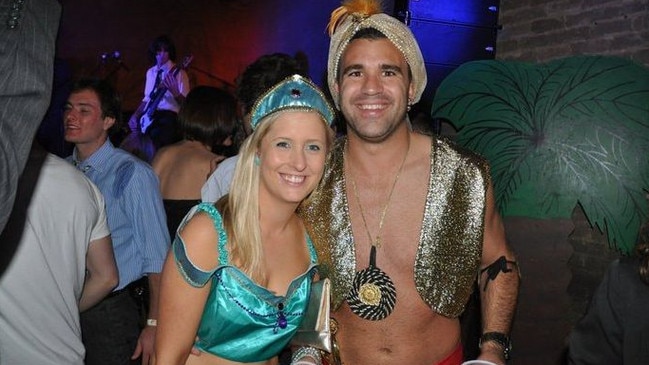
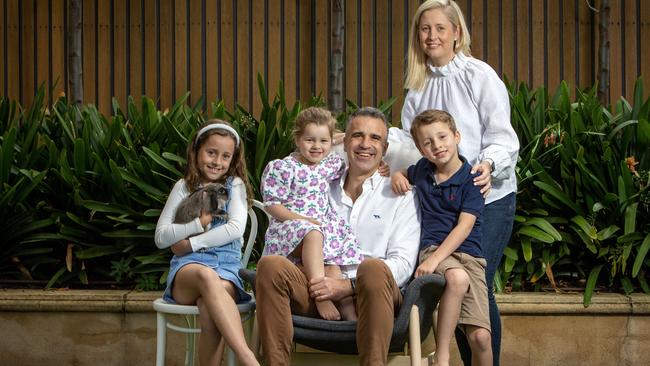
In Malinauskas’s first year in the job he’s thrown a lot of balls in the air.
He is pushing hard for a merger by the Universities of Adelaide and South Australia; is pressing ahead with a $600m punt on creating a hydrogen power plant near Whyalla; told us nuclear submarines will change the state; promised $15bn to finish the North-South corridor, and another $2bn to build a new women’s and children’s hospital (while knocking down a heritage building in the parklands); has introduced an Indigenous Voice to parliament; and indefinitely postponed the proposed First Nations gallery on North Terrace. Then there is a royal commission into early childhood, chaired by former PM Julia Gillard, which will undoubtedly come with a large bill, and, of course, that promise to “fix” ambulance ramping.
Follow that up with the bread-and-circuses approach that has seen government money spent to bring AFL’s Gather Round to Adelaide, which won widespread acclaim and ensured the state keeps it for another three years. Then there was singer Sam Smith for a concert in McLaren Vale, which elicited plenty of eyeballs but also plenty of criticism, and a review of the way influencers are used to promote the state amid some complaints of poor behaviour during the concert.
Not to mention the LIV golf tournament, which drew strong crowds but was slammed by opponents, such as former senator Rex Patrick and the Greens, as an attempt by Saudi Arabia to whitewash its global reputation with its almost $3bn backing of the series. In recent weeks, it also sparked a more local stoush, with some Grange golf members complaining about excessive damage to the course from the event
Throughout, Malinauskas has remained unrepentant, saying Saudi Arabia was a trading partner, which shared defence agreements with the country (and grain), the money wasn’t going to the regime, and “having LIV golf, having a tournament in Adelaide doesn’t equate to support of Saudi Arabia”. He says most opposing parties are trying to protect the US PGA “monopoly”.
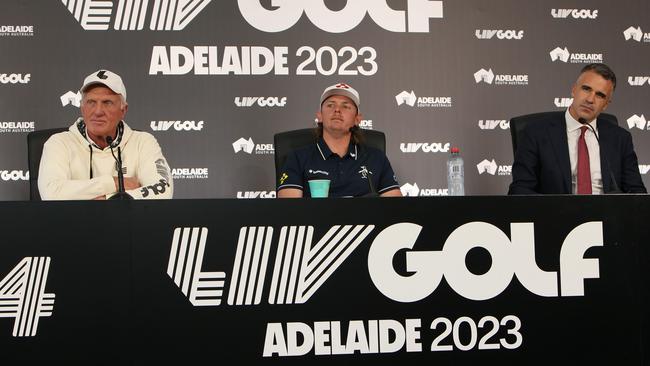
He is a confident fella, our Premier – a man who believes he can get things done. You’d have to look very close to find any sign of a crack in his self-assurance, and he’s clearly flying high in the wake of the Gather Round success.
Still, it’s hard to ignore the obvious fact that at some point all of those big policy and project balls will land. Any one of them could result in a political explosion. Few have been delivered yet. And that day will come.
The Premier says it’s about having “an appetite for bolder policy’’. “That brings with it a degree of risk, certainly brings with it a political risk, no doubt about it,’’ he says now.
Another question is whether the general public is ready for risk. In an increasingly polarised political world, even minor policy changes are leapt on by desperate opposition parties, of all hues, looking to score cheap political points.
We first meet the week after Prime Minister Anthony Albanese kicked off a media and political storm by announcing tweaks to superannuation to impose higher taxes on super balances of more than $3m. A change that affects vanishingly few people. And won’t come into play until after the next election.
The Malinauskas view is that the sound and fury that greeted the Albanese announcement is the “system at work”. The “system” being a combination of the media and the nature of politics. A natural combative element that feeds on conflict and simplistic judgments.
Malinauskas believes the system is not reflective of what the general public wants and needs from its political leaders, particularly in a world desperate to throw off the pandemic shackles.
“My assessment of the electorate is, it is up for that,’’ he says. “Because in the post-Covid environment, people want to know what’s next. We just spent two years being consumed by Covid. What’s the plan, post-Covid?
“The moment you announce policy, you set yourself up for criticism, so I get that. But we’re up for it and thus far we haven’t broken … I don’t think we stand accused of breaking any of our promises.’’
When Malinauskas became premier on March 19 last year his ascension fulfilled the long-held Labor prophecy that he would one day take the state’s top job.
The legend is well known. Malinauskas was spotted by Don Farrell, then head of the Shop, Distributive and Allied Employees Association, aka, the Shoppies. The largest union in the state. Malinauskas was an SDA member working at Woolies and studying commerce at Adelaide University.
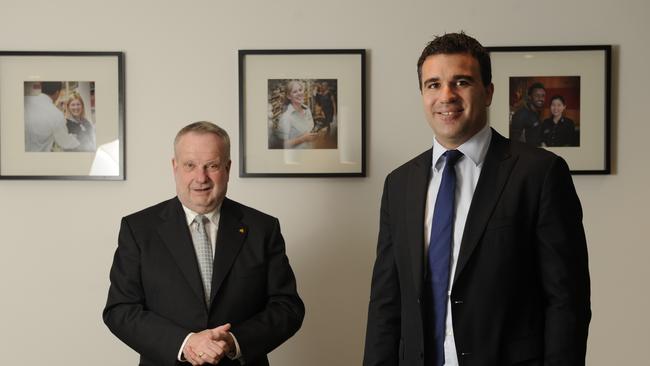
Farrell immediately tagged Malinauskas as a talent. In 2020, Farrell told SA Weekend: “You could see he was a serious sort of person. You could see he was the sort of person who could convince people of his cause and that is important in unionism.”
After finishing his degree, Malinauskas took a full-time job at the SDA. By 27, he was running the union after Farrell, now Australia’s Trade and Tourism Minister, left for federal politics.
Three years later he was telling long-serving premier Mike Rann his time was up and Jay Weatherill would be the state’s next premier.
In late 2015, Malinauskas was parachuted into a vacancy in the Legislative Council created by the departure of the disgraced Bernie Finnigan from parliament.
He went straight into Cabinet then switched to the safe lower house seat of Croydon for the 2018 election after the retirement of the long-serving Michael Atkinson. After the Weatherill government was defeated by Steven Marshall’s Liberals in that election, Malinauskas was installed as opposition leader.
Malinauskas takes issue with any idea that his rise to the premiership has been unencumbered by setbacks.
“There’s nothing about being leader of the opposition that’s smooth,” he says.
“And that’s particularly true when a global pandemic struck, and every incumbent around the country is getting a massive boost to public support – premiers are becoming rock stars around the country.’’
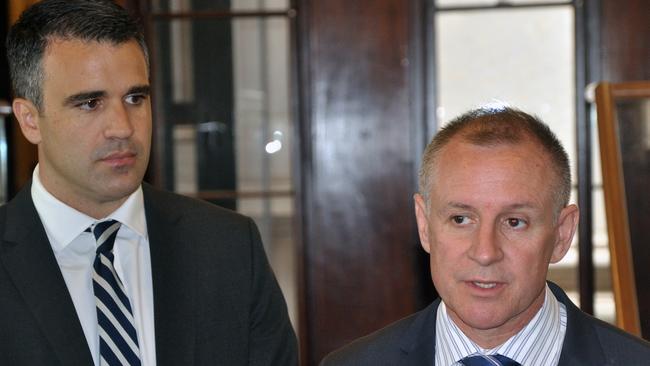
Malinauskas says now that “history was against us’ when it came to winning the 2022 election. “I was never expecting to win. I was hopeful and thought we could. But you never know,’’ he says. “During the election campaign, when polls started to suggest that we might be favourite, I was reluctant to believe it.’’
It’s true that for most of his time as opposition leader, Malinauskas was seen as unlikely to usurp Marshall as premier.
After all this was the Liberals’ first term in government after 16 years in opposition. The public throwing them out again after a single term seemed unlikely.
Marshall was regarded as having guided the state well through the pandemic. South Australia endured fewer and shorter lockdowns than almost anywhere else. The economy held up well. The Liberals should have had a good story to tell at election time.
But underneath it was a messy government.
A variety of scandals saw Liberal MPs quit the party. A comfortable majority in parliament turned into a fractious minority. Then, when the state did open its borders, omicron swept in and restrictions were again enforced. And to top it all off, the Liberal Party ran what could have been the most shambolic and inept election campaign in Australian political history.
Malinauskas and Labor in contrast ran a targeted and professional campaign that boiled down to health, specifically ambulance waiting times and ramping.
The Premier is a little touchy when questioned about the narrowness of his election campaign, coming to the conclusion that it was largely the media’s fault.
“I respectfully disagree with that”, is his response when asked about the “narrow” campaign. “What is covered I don’t control,” he explains. “When it comes to the election campaign, we started announcing our health announcements. And that gets a lot of attention just because it’s an election campaign.
“So all of a sudden the election has been defined by health.’’
He points to all the other policies that had been released well before the election. The hydrogen jobs plan, the uni merger, the plan to re-open technical colleges. He felt ripped off when Labor’s education policy, announced in October 2021, didn’t garner the coverage he thought it deserved.
Despite Labor’s patchy record when it was in government, it knew it could generate political traction in health. Which explains all the posters that appeared across the state proclaiming “Labor will fix the ramping crisis’’.
Since the election, ramping has worsened and Malinauskas has taken to rely on the fine print defence, pointing out the terms and conditions of the “fix” promise. That the actual promise before the election was that ambulance response times would return to 2018 levels by 2026.
Malinauskas says that is how he outlined the promise “at every press conference when I got asked about it.’’
“I was doing radio interviews when I was making it plainly clear that doesn’t mean eliminate ramping. It means getting it down to a level where ambulances start rolling up on time,” he says.
The problem for Malinauskas is that ramping and health represent possibly the biggest political risk for Labor before 2026.
It’s the best and easiest issue for the Liberal opposition to prosecute.
A fact of which the Premier is only too aware.
“I think delivering on our commitments is always better,” he says. “If you don’t, it represents a risk. But we’re determined to do that, we haven’t broken any promises yet and we’re not about to start.’’
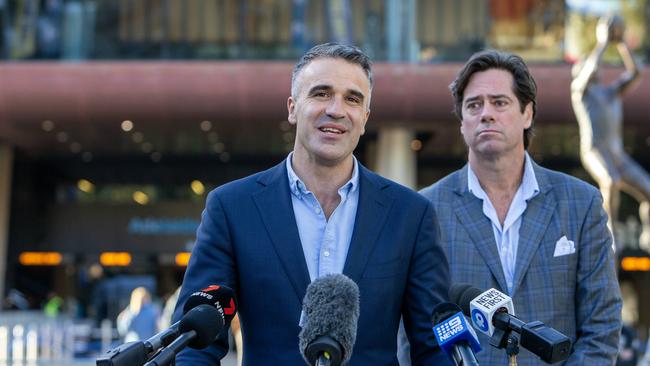
The truth is, Malinauskas has emerged from his first year in office relatively unscathed. There have been some bumps, mainly in that health area and legitimate questions about the ethics of Saudi involvement in the golf, but supporters will argue his star has risen exponentially in the wake of the Gather Round, which put the state, and his mug shot, on the national stage like few others in recent memory.
He has also been helped by a Liberal opposition still finding its feet after its humbling election loss.
However, the next 12 months are likely to be far more challenging and a truer indication of what kind of premier Peter Malinauskas will turn out to be. The nuclear submarine deal with the US and the UK has been announced by Prime Minister Anthony Albanese, and while Malinauskas is keen to promote its benefits, much about the deal remains opaque or could be changed. The Royal Commission Into Early Childhood Education and Care led by Julia Gillard has released an interim report calling for free preschool for three-year-olds, the uni amalgamation is to be agreed by June 30.
The report on what to do with the proposed Indigenous art and culture gallery at Lot 14 on North Terrace, commissioned by the previous Liberal government, is also expected soon.
The $15bn North-South corridor work will rumble as the state spends what even Malinauskas acknowledges is a “ridiculous amount of money”. Although he is also quick to point out that the federal government is paying half and believes “I don’t think we could have landed a better outcome”.
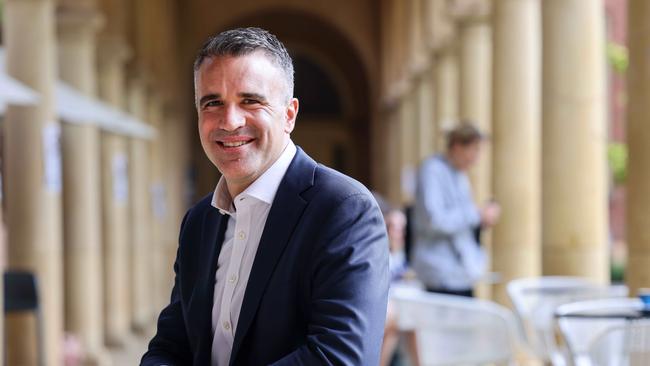
Then there is the $600m hydrogen power plant. The plan is to “deliver a 250-megawatt hydrogen production facility, 200-megawatt hydrogen power plant and fit for purpose hydrogen storage infrastructure in the Whyalla area by December 2025”.
That’s an enormous undertaking. Perhaps best filed under the heading “high risk, high reward”. There are no guarantees this will work. But as Malinauskas sees it, as the world moves towards decarbonisation, South Australia can gain an advantage on other states, which are also examining hydrogen, and cement itself as a green energy leader.
It’s not just about selling hydrogen overseas, although that will be part of it. Malinauskas says the “more substantial economic opportunity’’ is what we can do within the state’s borders.
That if South Australia can produce not only cleaner, but cheaper electricity then we can both attract more business to the state and make stuff here that can be exported.
“Global capital is now moving around the world in such a way that it is actively investing in opportunities that are green, or opportunities to be able to take existing industry and make it greener. But you can’t solve that equation without access to cleaner energy,” he says.
“And we can produce cleaner energy more abundantly and more efficiently than other parts of the world, because of our access to, basically, solar and wind.’’
Going back decades, South Australia has lagged the rest of Australia in just about any economic measure you care to mention. Economic growth, employment, population growth, foreign investment.
A report released by Austrade in February found South Australia contributed only 3 per cent of the value added to the national economy by companies who exported.
The phrase “economic complexity’’ has become a catchphrase for Malinauskas who cites the nascent hydrogen industry, as well as defence, space and cyber as growth opportunities.
Finding people to fill all these potential jobs could be as much of a challenge as anything else.
Malinauskas says he was appalled when he came to office that there was no plan to produce skilled workers. No plan by any previous state or federal government.
When put to him that it sounds like a dereliction of duty by previous governments, including the one he served in as a senior cabinet minister, he doesn’t disagree. “I don’t think that’s an unreasonable observation.’’
One of the outcomes of the federal government’s Jobs Summit last year was an agreement to work on such a plan.
It’s also, Malinauskas says, why he is in favour of a bigger university.
Malinauskas says these multiple tests energise him. That even after a year of running flat out, he knows the pace will keep accelerating. “I’m pumped for it. It makes it easy to get out of the bed in the morning and get fired up,” he says. “Otherwise, why are we here?”
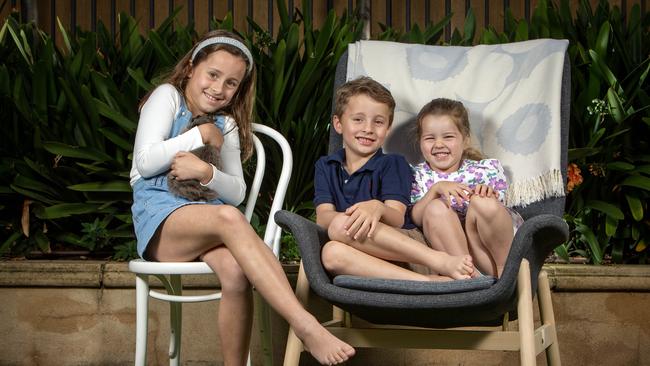
Back on the home front, the biggest challenge for Adelaide’s highest-profile power couple is to eke out some time to share together.
They might use it to, again, laugh about election night when the Premier was horrified after realising he forgot to thank his wife in his victory speech. “I wouldn’t be here without Annabel,” he would say later. “She actually helped me put the speech together and when I started talking about Mum and Dad I could feel myself getting a bit emotional … then I moved on to the next part of the speech with the intent to come back and that didn’t happen.
When we got in the car together afterwards, it dawned on me.”
It’s a hectic life. But, as Annabel Malinauskas understands, nothing in politics is forever. It’s just that sometimes it feels like it is. In the meantime, no doubt there will be more electronic intervention, more iPads, more scrabbling for time.
And another date night in a seaside holiday town, wondering how they can fit it all in.
Originally published as Meet Peter Malinauskas and his family: Kids, politics and planning their social calendar a year in advance


